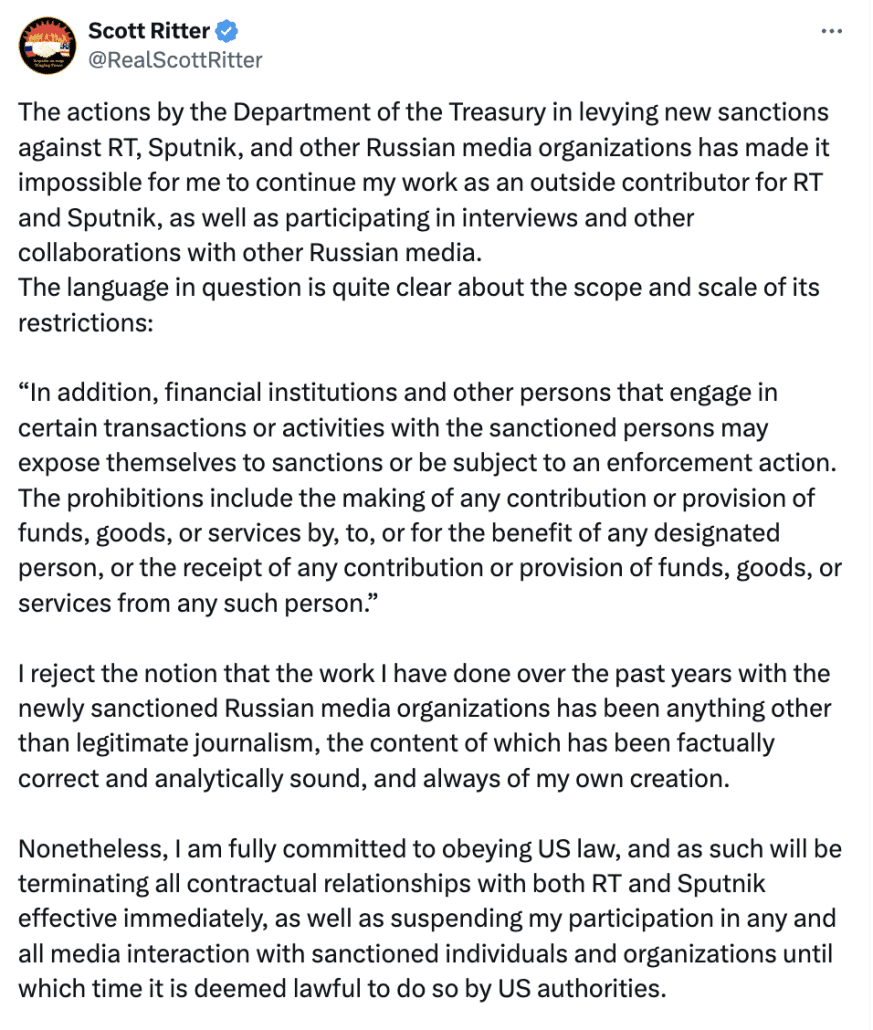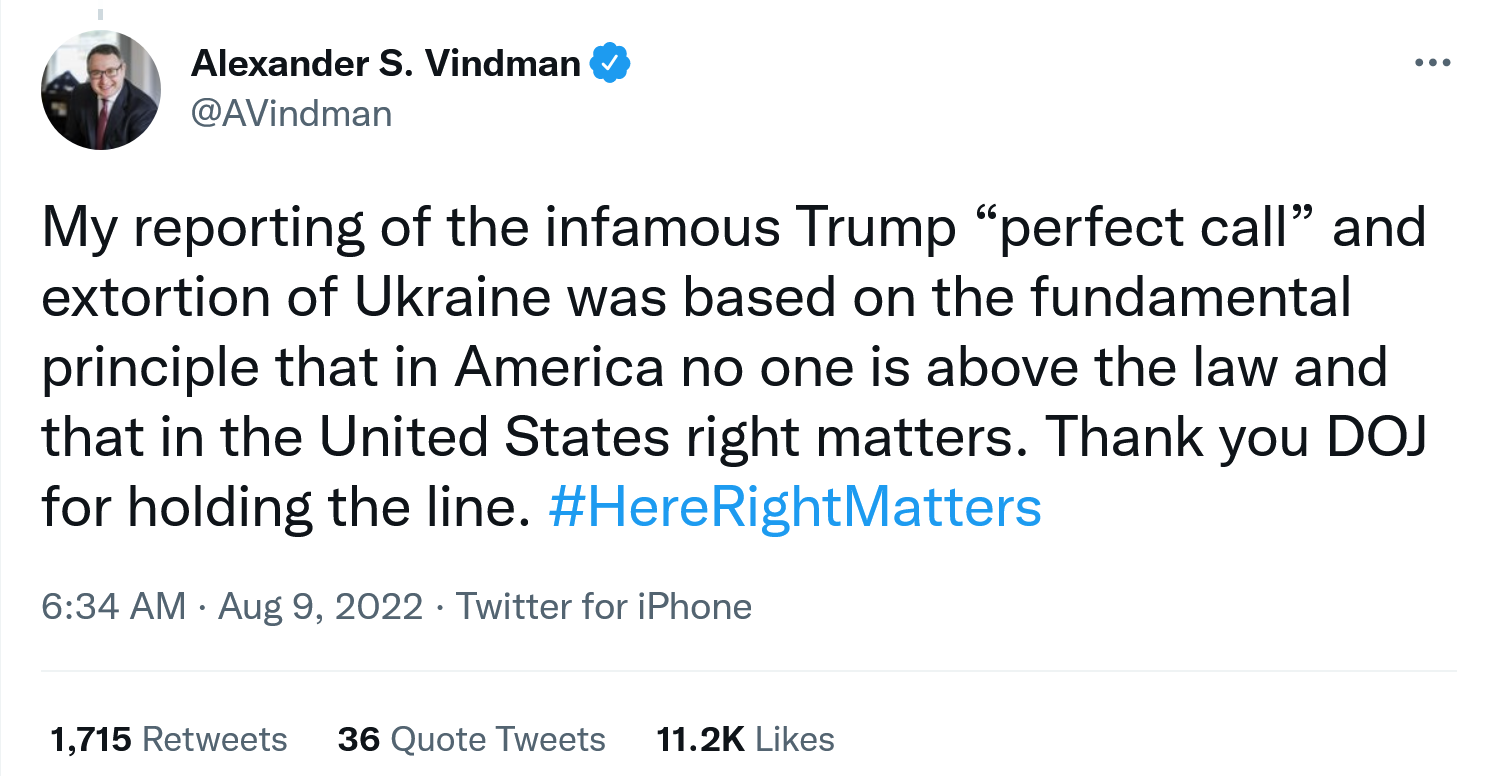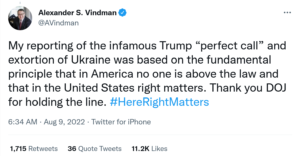Useful Idiots: DOJ Moves from Name-and-Shame to Name-and-Disrupt
In the Election Task Force presser at which DOJ also rolled out two operations against Russian foreign malign influence last week, Merrick Garland described that the investigation into RT’s efforts to hide its efforts in the US was ongoing. “The charges unsealed this morning do not represent the end of the investigation. It remains active and ongoing.”
Indeed, last week, Tim Pool (believed to be Commentator-2 in the RT indictment) revealed that he would assist in the investigation (presumably meaning he’ll sit for the interview the FBI requested).
The language Pool used — the emphasis on a voluntary interview, one echoed by Benny Johnson’s more equivocal statement about his response to a similar FBI invitation — suggests DOJ is treating Pool, and so presumably most of the other commentators described in the indictment, as media under DOJ’s recently updated media guidelines.
Not so Lauren Chen herself — or at least, not Tenet Media. After all, the indictment describes several Discord servers — a general one, one focused on “funders,” another on “producers,” and another for one of the commentators — that all seem to be part of Tenet’s overarching Discord server run by Chen. To get legal process on that, as they clearly did, prosecutors would have had to convince DOJ’s National Security Division head, Matt Olsen, that Tenet or Chen either aren’t media or fit into one of the designated exceptions to the media rule.
Prosecutors might do that through Chen’s (or her spouse, Liam Donovan’s) past work with RT, after such time as it had registered as an agent of Russia in 2017. Or, if DOJ could prove that Chen knew the Russians she was working for were just an extension of her pre-existing RT contract, that might also satisfy the exception for “a foreign power or agent of a foreign power.” But even Chen’s acceptance of US-bound payments via wire from “Turkish Shell Entity-1” described as, “BUYING GOODS-INV.013-IPHONE 15 PRO MAX 512GB” would likely reach an aid-and-abet standard for RT’s alleged money laundering.
According to the indictment, the many cut-outs via which she (and by association, the podcasters) were being paid, were visible to her. None were in France, where the fictional funder of the project purportedly lived. She was witting to the money laundering alleged in the indictment, which probably qualifies her for an exception to the media guidelines. Charging that money laundering may be one step in justifying a broader investigation into Chen, including one that extends into her other roles in the far right network at Glenn Beck’s show and on Turning Point USA.
This post, which I started last week, was going to be a post laying out how all of last week’s activities seem to be an attempt to move beyond DOJ’s prior approach of name-and-shaming foreign hackers, to a name-and-disrupt approach. Lawfare did such a post earlier this week, and Alex Finley did one focused on RT and Doppelganger.
But I’m going to post the part of that larger post focused on RT now, because State just rolled out the next step of this name-and-disrupt operation: sharing intelligence showing how RT has become a front for Russia’s broader intelligence operations.
The State Department revealed declassified US intelligence findings that suggest RT is fully integrated into Russia’s intelligence operations around the world and announced it is launching a diplomatic campaign to provide countries with information about the risks associated with RT activities.
“Thanks to new information, much of which originates from RT employees, we know that RT possessed cyber capabilities and engaged in covert information and influence operations and military procurement,” Secretary of State Antony Blinken said Friday.
A key finding from the new US intelligence is that, for more than a year, the Russian government has quietly embedded an intelligence-gathering unit within RT that is focused on influence operations globally. That activity has been part of US officials described as a big expansion of RT’s role as an arm and mouthpiece of the Kremlin abroad. The activity goes beyond propaganda and covert influence operations to even include military procurement, according to US officials.
The flyer from State laying this out lists cover operations in Germany, France, and Argentina.
DOJ presumably timed last week’s indictment to beat the 60-day prohibition on announcements that might effect an election. But it was presumably also coordinated with Anthony Blinken’s trip to Eastern Europe, whence he just returned.
It appears that rolling out the indictment did two things. First, it laid out how this works, how a persona sets up an allegedly witting front, like Lauren Chen, to effectively recruit useful idiots on Russia’s behalf.
But by unrolling the indictment last week, DOJ likely facilitated further investigation of the Tenet operation.
It’s likely, for example, that DOJ needs cooperation from the podcasters like Benny and Pool to pursue an investigation into Chen any further. At the very least, prosecutors would have to lock them into statements that they had no idea they were working for RT. Those statements might not be entirely persuasive, mind you, but such statements would be crucial to showing that Chen was part of the RT deception, part of an effort by an agent of Russia to spread their propaganda via unwitting cut-outs.
By rolling out the indictment in the way they did, DOJ gave all the podcasters an incentive to immediately claim ignorance, if for no other reason than to preserve their own brand. As NBC curated, several of the podcasters did claim they were victims, within a day.
Pool said, in part, in a lengthy statement on X: “Should these allegations prove true, I as well as the other personalities and commentators were deceived and are victims. I cannot speak for anyone else at the company as to what they do or to what they are instructed.”
[Benny] Johnson, also on X, said: “A year ago, a media startup pitched my company to provide content as an independent contractor. Our lawyers negotiated a standard, arms length deal, which was later terminated. We are disturbed by the allegations in today’s indictment, which make clear that myself and other influencers were victims in this alleged scheme. My lawyers will handle anyone who states or suggests otherwise.”
[Tayler] Hansen said, in part, on X: “These allegations come as a complete shock to me and the other hosts at TENET Media. I want to be as clear as possible, I was never directed to report on any topic and had complete freedom and control over my reporting at all times. I would never agree to any arrangement where I am not the sole person in charge of the stories I cover and content I create.”
[Dave] Rubin said, in part, on X:” These allegations clearly show that I and other commentators were the victims of this scheme. I knew absolutely nothing about any of this fraudulent activity. Period.”
[Matt] Christiansen said, in part, on X: “At no point has anyone ever directed me what to say or not to say, and I would never agree to anything otherwise. My videos and streams for Tenet are exactly the same as my videos and streams on my personal channels. Every word is from me and me alone.” [my emphasis]
And after they did claim to be victims, the FBI called them up and said, “how would you like to sit for a voluntary interview … you know, as a victim?”
This is why I’m way more sympathetic to Pool and Benny’s claims they’re victims than others, who rightly argue they had to have known something sketchy was going on: not because I believe they were that stupid (both could have been, but Pool, who hired Cassandra Fairbanks after she was already tainted as a Sputnik persona, has been swimming in these waters for years). But because DOJ set this up to highly motivate them to position themselves, publicly, as victims and then capitalized on that to take further investigative steps.
But this operation also served to disrupt Russian support of propaganda, which is one of the reasons I view the efforts rolled out last week as an attempt to disrupt ongoing efforts, rather than just an attempt to name-and-shame.
After all, the podcasters (Rubin and Benny had already moved on; the others had not) are out of a hefty paycheck. Tim Pool will either have to find some right wing billionaire to pay wildly inflated rates for his apology for Russia from here on out, or he’ll have to scale back. It might take some weeks to do that. He might even have to give up politicizing the local skateboard park.
By sanctioning RT, among others, upon release of this indictment, not just the Tenet podcasters, but anyone else in the US knowingly on the RT grift, has to drop their gig immediately.
Presumably, a number of other people are doing quietly what former weapons inspector Scott Ritter did quite boisterously last week. Ritter — who, last month, had his house searched — posted that the sanctions on RT meant he had to immediately drop his RT gigs.
Per his claims in a Substack post released since then, Ritter was getting nothing close to what the podcasters were.
Amidst revelations of multi-million dollar deals where influencers were paid $100,000 a week to produce video content, and on-air hosts given million dollar salaries along with other perks, my relationship with Russian state-owned media pales into insignificance, contracted as an outside contributor compensated with what now, by comparison, seems a paltry $250-280 per item published, with the total amount received amounting to less than 7% of my total annual income.
Apparently, my negotiating skills are lacking—rather than insisting that I would not consider any offer under $5 million, I was content with compensation that matched the industry “norm” of between $150-300 per item published. Earlier this year, when RT thought that my interest in contributing had waned, they offered to double the price paid per article; I declined, insisting that we adhere to the letter of our agreement.
And now having done that — having forced people who were being supported by RT to drop their gigs — partners around the world can turn to unpacking similar operations in their own countries.
There are, undoubtedly, other nodes like the Tenet one, both in the US and around the world. This one may have been particularly important to disrupt before the election, because of Chen’s involvement with Turning Point, which will have a key role in Trump’s GOTV.
But whatever she was doing, TPA has cut her off.





